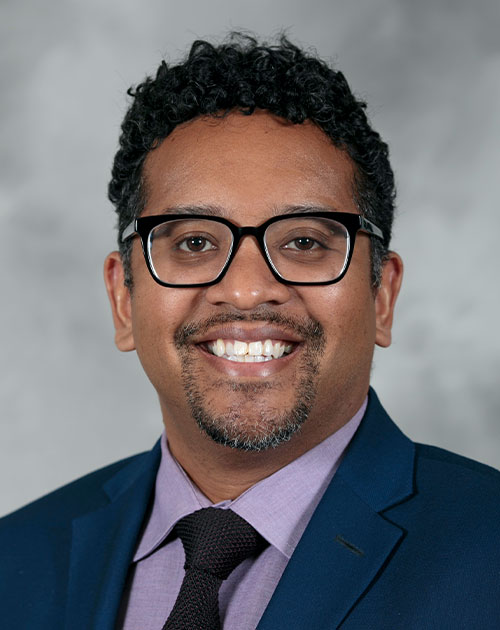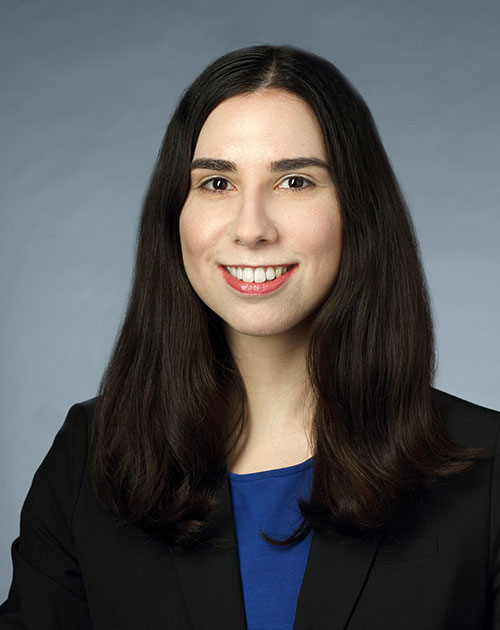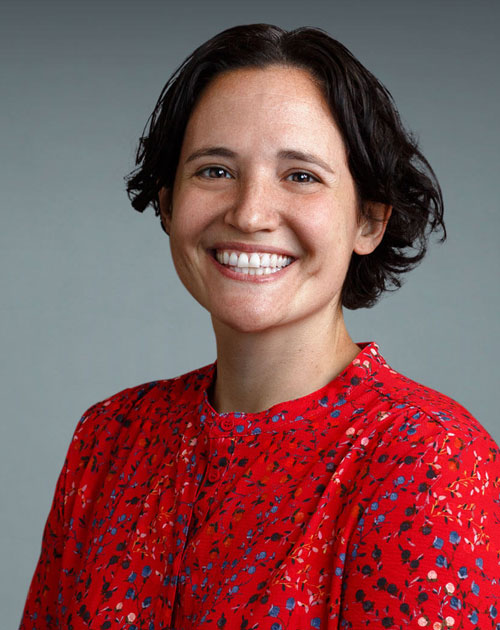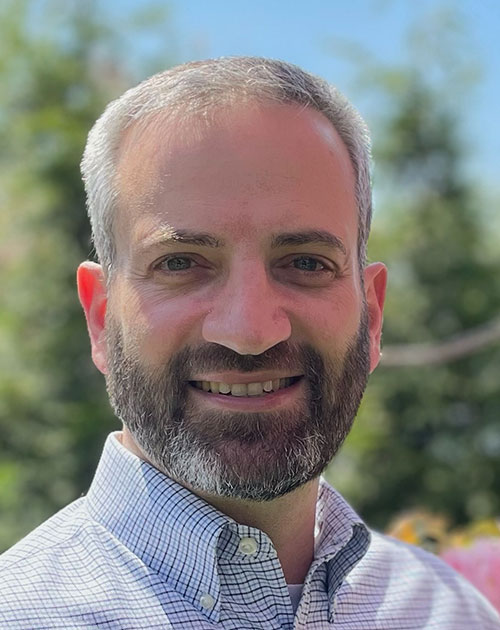Current Scholars
Meet this year’s exceptional scholars who are driving implementation of effective strategies to raise awareness of diagnosis in medicine, support diagnostic excellence, and reduce diagnostic errors at the national level. If you would like to connect with any of them, please contact us.
Carl Berdahl, MD, MS
Cedars-Sinai Medical Center
Jessica Gold, MD, PhD
Northwell Health/Feinstein Institute of Medical Research
Andrew A. Gonzalez, MD, JD, MPH
Indiana University School of Medicine
Bat-Zion Hose, PhD
MedStar Health
Sanjiv Mehta, MD, MBE
University of Pennsylvania/Children’s Hospital of Philadelphia
Matthew Nielsen, MD, MS, FACS
University of North Carolina School of Medicine
Gezzer Ortega, MD, MPH
Brigham and Women’s Hospital/Harvard Medical School
Verity Schaye, MD, MHPE
New York University Grossman School of Medicine
Shazia M. Siddique, MD, MSHP
University of Pennsylvania
Gary Weissman, MD, MSHP*
University of Pennsylvania Perelman School of Medicine
*Supported by The John A. Hartford Foundation to advance diagnostic excellence and equity for older adults
 Carl Berdahl, MD, MS
Carl Berdahl, MD, MS
Cedars-Sinai Medical Center
Dr. Berdahl is a health services researcher in the field of diagnostic excellence in emergency medicine. He currently serves as an attending emergency physician at the Ruth and Harry Roman Emergency Department at Cedars-Sinai Medical Center, where he is assistant professor in the Departments of Medicine and Emergency Medicine. He also maintains appointment as a physician policy researcher at the RAND Corporation and Health Sciences Assistant Clinical Professor at the University of California, Los Angeles (UCLA) David Geffen School of Medicine.
Dr. Berdahl’s research focuses on diagnostic excellence, quality measurement, clinical informatics, artificial intelligence, and vulnerable populations. He has published studies evaluating the use of diagnostic testing in the emergency department (ED) setting, including studies characterizing imaging overuse and studies elucidating imaging pathways to diagnose appendicitis. During the COVID-19 pandemic, he began investigating how innovations spread among emergency department clinicians and how the use of temperature can be enhanced to improve diagnosis of infectious diseases. Dr. Berdahl is currently researching how to enhance detection of diagnostic missed opportunities in the ED by engaging with patients and clinicians after patients have left the ED. Additionally, together with a team from the RAND Corporation, he is investigating how clinicians can systematically review their own diagnostic performance to identify and learn from missed opportunities.
Dr. Berdahl received his B.A. from UCLA and his M.D. from the Yale University School of Medicine. He completed emergency medicine residency at Los Angeles County + University of Southern California Medical Center, where he served as Chief Resident of Education during his final year. He then obtained an M.S. in Health Policy and Management with a concentration in Implementation and Improvement Science from the UCLA Fielding School of Publish Health. Dr. Berdahl also completed fellowship in UCLA’s National Clinician Scholars Program.
Proposal: Partnering with Patients and Clinicians to Improve Diagnosis in the Emergency Department
 Jessica Gold, MD, PhD
Jessica Gold, MD, PhD
Northwell Health/Feinstein Institute of Medical Research
Dr. Gold is as an assistant professor of pediatrics and the Director of Newborn Screening at Northwell Health. In her current role at Northwell Health, she is the principal investigator of the Long-term Outcomes of Newborn Screening operated by New York State and the Lysosomal Storage Disease Registry.
Dr. Gold’s recent work examined racial and socioeconomic disparities in genetics evaluation, which demonstrated significantly lower referral rates and disproportionately high diagnostic yield for adults from underrepresented communities, suggesting structural barriers affected access to genetic testing and diagnosis. As one of the only physician-scientists trained in pediatrics, internal medicine, clinical genetics, and medical biochemical genetics to translate recent, pediatric-focused innovations in genetic diagnosis to adults, Dr. Gold dedicates her career on improving access to genetics care for underserved communities, especially adults with rare disease, and mainstreaming genomic testing with the overall goal of making genetic diagnosis accessible and equitable.
Dr. Gold received her B.S. from Brandeis University and her M.D. and Ph.D. from Thomas Jefferson University. She completed a combined residency in internal medicine and pediatrics at the University of Chicago, which provided a specialized training in caring for adolescents and young adults with complex childhood conditions. Dr. Gold also completed a fellowship training in clinical genetics and medical biochemical genetics at the Children’s Hospital of Philadelphia.
Proposal: Mainstreaming Genomic Testing to Increase Diagnostic Accessibility for Adults with Intellectual and Developmental Disabilities
 Andrew A. Gonzalez, MD, JD, MPH
Andrew A. Gonzalez, MD, JD, MPH
Indiana University School of Medicine
Dr. Gonzalez is a board-certified vascular surgeon at Indiana University School of Medicine. His clinical expertise includes limb optimization/salvage for Peripheral Arterial Disease (PAD), advanced open and endovascular aortic interventions, dialysis access, and vascular trauma for under-resourced patients at Eskenazi Health and Indiana University Health.
Beyond his clinical roles, Dr. Gonzalez is Associate Director for Data Science at the Regenstrief Institute’s Center for Health Services Research and co-Assistant Director of the Indiana University Surgical Outcomes & Quality Improvement Center. He works across the disciplines of surgery, population health, clinical informatics, and human-centered design to develop clinical decision support systems using artificial intelligence/ machine learning. He is passionate about using intelligent systems to enhance health equity and improve clinical care. For the Diagnostic Excellence program, his project focuses on developing an equity-focused framework for developing machine learning based clinical decision tools for PAD.
Dr. Gonzalez earned his B.S., J.D., M.P.H, and M.D. from the University of Illinois at Chicago (UIC). He completed a general surgery residency at the UIC and a NHLBI-T32 post-doctoral fellowship and vascular and endovascular surgery clinical fellowship at the University of Michigan. Dr. Gonzalez was the 2021-2023 Gilbert S. Omenn Fellow at the National Academy of Medicine.
Proposal: An Equity-Grounded Approach to Developing Computational Phenotypes for Peripheral Arterial Disease
 Bat-Zion Hose, PhD
Bat-Zion Hose, PhD
MedStar Health
Dr. Hose is an industrial engineer with specialized training in human factors and systems engineering. She currently serves as a Research Scientist at the National Center for Human Factors in Healthcare within the MedStar Health Research Institute. Previously, Dr. Hose was an Adjunct Professor at Drexel University in the College of Computing and Informatics.
Dr. Hose's research explores the complexity of team-based care processes for vulnerable and equity-seeking populations, applying human factors and systems engineering principles. She is dedicated to developing human factors engineering methods and approaches to support the continuous design process for team-based care solutions, such as health information technology and communication protocols. Her work involves collaborating with diverse groups of care team members, integrating their multiple perspectives in the design of usable solutions. Dr. Hose's research encompasses the design, evaluation, and implementation of solutions aimed at supporting healthcare teams in providing high-quality, safe patient care, with a strong focus on enhancing diagnostic safety and equity. Her work has been funded by the Agency for Healthcare Research and Quality and the National Heart, Lung, and Blood Institute.
Dr. Hose received her B.S., M.S., and Ph.D. from the Department of Industrial and Systems Engineering at the University of Wisconsin-Madison. She completed a Postdoctoral Fellowship at the University of Pennsylvania Perelman School of Medicine.
Proposal: A Work System Design for Effective Teamwork in the Diagnostic Process
 Natalia Khalaf, MD, MPH
Natalia Khalaf, MD, MPH
Michael E. DeBakey Veterans Affairs Medical Center/Baylor College of Medicine
Dr. Khalaf is a research scientist at the Center for Innovations in Quality, Effectiveness and Safety at the Michael E. DeBakey Veterans Affairs (VA) Medical Center and an assistant professor of medicine at Baylor College of Medicine in the Section of Gastroenterology and Hepatology.
Dr. Khalaf’s scholarship centers around improving the timeliness of cancer diagnosis through the use of health IT and informatics tools. Her research leverages electronic health records to develop tools that identify and reduce delays in cancer diagnosis. Dr. Khalaf’s proposal seeks to advance diagnostic excellence through use of digital quality measures to optimize the diagnostic process as it relates to cancer care. She is funded by a VA Health Services Research & Development (HSR&D) Career Development Award and the Gordon and Betty Moore Foundation to study health informatics approaches to reduce missed opportunities for more timely diagnosis among colorectal and pancreatic cancer patients.
Dr. Khalaf earned her B.A. from Rice University. She completed her M.D. and internal medicine residency training at Baylor College of Medicine and received her M.P.H. from the Harvard T.H. Chan School of Public Health with a concentration in cancer epidemiology. Dr. Khalaf attended Brigham and Women’s Hospital for her subspecialty training in gastroenterology and hepatology, where she was an NIH-funded T32 Clinical Research Fellow.
Proposal: Implementing Digital Quality Measures into Learning Health Systems for Diagnostic Excellence in Cancer Care
 Sanjiv Mehta, MD, MBE
Sanjiv Mehta, MD, MBE
University of Pennsylvania/Children’s Hospital of Philadelphia
Dr. Mehta is an assistant professor of critical care medicine at the Children’s Hospital of Philadelphia (CHOP) and University of Pennsylvania. Locally, he co-leads the Early Warning subcommittee of the Preventing Clinical Deterioration Outside of the intensive care unit (ICU) harm prevention program to develop systems and technologies to support early recognition of clinical deterioration.
Dr. Mehta’s scholarly work focuses on improving the prediction, preparation, and prevention of clinical deterioration in hospitalized children. He has studied the impact of novel care models, including critical care outreach to support ward recognition of deterioration, and is developing informatics tools for the early identification of critical illness inside and outside the ICU. In a recent single center study, he found high rates of diagnostic error in deterioration events requiring emergent transfer to the ICU. Dr. Mehta is now leading a multicenter effort to evaluate diagnostic opportunities in similar cases, with the goal of creating novel diagnostic decision supports to enhance decision-making during clinical deterioration events.
Dr. Mehta received his B.A. from Columbia University and M.D. and M.B.E. from the University of Pennsylvania School of Medicine. He completed pediatric residency and pediatric critical care fellowship at CHOP. He is currently pursuing an M.S. in Clinical Epidemiology at the University of Pennsylvania.
Proposal: Transforming Our Approach to Pediatric Clinical Deterioration with Diagnostic Reasoning Interventions
 Matthew Nielsen, MD, MS, FACS
Matthew Nielsen, MD, MS, FACS
University of North Carolina School of Medicine
Dr. Nielsen is The John Sloan Rhodes and John Flint Rhodes Distinguished Professor and Chair for the University of North Carolina (UNC) Department of Urology, where he received the UNC Health Care System Physician Friend of Nursing Award and the H. Fleming Fuller Award in recognition of his service as a physician leader. He serves on the adjunct faculty in the Departments of Epidemiology and Health Policy & Management in the UNC Gillings School of Global Public Health.
Dr. Nielsen’s clinical practice focused in urologic oncology dovetails with his research in medical decision-making, cancer care quality, and implementation science, which has been nationally recognized by the Rising Stars in Urology Research Award. He is actively engaged in quality improvement and patient safety efforts as Director of Quality for UNC Faculty Physicians. He previously served the American Urological Association (AUA) as Chair of the Quality Improvement and Patient Safety (QIPS) Committee and currently serves as Chair of the AUA Science and Quality Council, overseeing and coordinating activities across AUA’s QIPS, Data, and Guidelines Committees. He has also served on the American College of Physicians’ High Value Care Task Force and Performance Measurement Committee and the National Quality Forum’s Diagnostic Excellence Committee. In 2019, he was appointed to the Centers for Medicare and Medicaid Services’ Technical Expert Panel for their Quality Measure Development Plan and Quality Measure Index.
Dr. Nielsen completed his B.A. at the University of Kansas, where he pursued a concentration in Health Policy and Law. He received his M.D. with Alpha Omega Alpha honors from The Johns Hopkins University School of Medicine and completed his residency training at the Brady Urological Institute of Johns Hopkins Hospital, where he served as Assistant Chief of Service prior to joining the faculty at UNC in 2008. In 2018, he was recognized as a Young Urologist of the Year by the AUA.
Proposal: Advancing Diagnostic Excellence and Health Equity in Prostate Cancer Through Enhanced Quality in MRI and MRI Fusion Biopsy
 Gezzer Ortega, MD, MPH
Gezzer Ortega, MD, MPH
Brigham and Women’s Hospital/Harvard Medical School
Dr. Ortega is an assistant professor of surgery and Lead Faculty for Research and Innovation for Equitable Surgical Care at the Center for Surgery and Public Health in the Department of Surgery at the Brigham and Women’s Hospital (BWH), Harvard Medical School. He is also an Adjunct Faculty at the Patient Reported Outcomes, Value & Experience Center and a Clinical Affiliate at the Healthcare Transformation Lab.
Born in a low-income Brooklyn neighborhood to immigrant parents from the Dominican Republic, Dr. Ortega’s work centers on improving surgical care for low-income and historically underserved populations, promoting language-concordant care for patients with a non-English preferred language and leveraging digital health solutions to achieve health equity for all surgical patients. He serves as the Principal Investigator of a National Institute on Minority Health and Health Disparities (NIMHD) K23 and BWH Center for Diversity and Inclusion Minority Faculty Career Development Award focused on improving outcomes for surgical patients with LEP. Dr. Ortega endeavors to diversify the academic physician workforce and is a Co-Founder of the Latino Surgical Society. Previously, he was the Project Director for the Provider Awareness and Cultural Dexterity Toolkit for Surgeons (PACTS) Trial, a NIMHD R01 project to develop and evaluate a curriculum for surgical residents to improve cross-cultural communication and engagement.
Dr. Ortega earned a B.S. from Syracuse University, an M.P.H. from the Johns Hopkins Bloomberg School of Public Health, and an M.D. from Howard University College of Medicine.
Proposal: Improving Technology-Based Interpreter Services and Resources for Patients with Limited English Proficiency
 Verity Schaye, MD, MHPE
Verity Schaye, MD, MHPE
New York University Grossman School of Medicine
Dr. Schaye is an associate professor of medicine at New York University (NYU) Grossman School of Medicine, where she practices as a hospitalist at Bellevue Hospital. In the medical school, she serves as the Assistant Dean of Education in the Clinical Sciences overseeing the clinical curriculum and assessment program. She also serves as the Assistant Director for Curricular Innovation in the Institute for Innovations in Medical Education at NYU focusing on integration of technology and artificial intelligence in the teaching and assessment of clinical reasoning.
Dr. Schaye’s research journey has been dedicated to advancing the fields of clinical reasoning, diagnostic error, artificial intelligence (AI)/informatics, and medical education. Her recent project, funded by the National Board of Medical Examiners (NBME) Stemmler fund, focuses on the use of AI for assessment of clinical reasoning documentation. Her current work focuses on building an AI-based diagnostic performance feedback system for internal medicine residents. She also has been a key member of the Society to Improve Diagnosis in Medicine as a prior fellow in Diagnostic Excellence, Chair of the 2023 meeting, and section editor for its journal Diagnosis.
Dr. Schaye earned her B.A. from Princeton University. She completed her M.D. and internal medicine residency training at NYU Grossman School of Medicine. She received an M.H.P.E. from Maastricht University.
Proposal: Diagnosis AId: Development of an Artificial Intelligence-Based Diagnostic Performance Feedback System
Shazia M. Siddique, MD, MSHP
University of Pennsylvania
Dr. Siddique is an assistant professor of medicine in the Division of Gastroenterology, Senior Fellow at the Leonard Davis Institute for Health Economics, and Senior Scholar for the Center for Clinical Epidemiology and Biostatistics at the University of Pennsylvania. She holds two notable health system roles for Penn Medicine: Director of Research for the Center for Healthcare Improvement and Patient Safety and Associate Director for Research for the Center for Evidence-based Practice. In this latter role, Dr. Siddique is part of the core team the ECRI-Penn Evidence-based Practice Center funded by the Agency for Healthcare Research & Quality. Dr. Siddique has also served in national committees for the American Gastroenterological Association (AGA), most recently on the clinical guidelines committee, and is the incoming chair for the government affairs committee.
As a health services and health equity researcher, and a quality and patient safety leader, Dr. Siddique’s scholarship is focused on incorporating health equity into evidence synthesis methodology, guideline development, and implementation science. Her recent work in diagnostic excellence is related to evaluation of iron deficiency anemia, which is a common but often over-looked indicator of gastrointestinal disease, including cancer. After coauthoring the AGA Clinical Guideline on this topic, Dr. Siddique’s research found notable gaps in guideline-concordant care, particularly for women, Black, and LatinX populations. She is currently working with the AGA and the Association of Black Gastroenterologists to develop clinician-directed and patient-focused interventions to improve the uptake of diagnostic testing for iron deficiency anemia.
Dr. Siddique earned her B.S. from Drexel University and her M.D. from Rutgers Robert Wood Johnson Medical School. She completed her medical residency at the Johns Hopkins Hospital and gastroenterology fellowship at the University of Pennsylvania, where she also obtained her M.S.H.P.
Proposal: Narrowing Health Disparities in the Diagnostic Evaluation of Iron Deficiency Anemia
 Gary Weissman, MD, MSHP*
Gary Weissman, MD, MSHP*
University of Pennsylvania Perelman School of Medicine
Dr. Weissman is a practicing pulmonary and critical care physician, scientist, and educator, at the University of Pennsylvania Perelman School of Medicine. He is an assistant professor of medicine and informatics, a core faculty member of the Palliative and Advanced Illness Research (PAIR) Center, and Senior Fellow of the Leonard Davis Institute of Health Economics. In these roles, he cares for patients in the medical intensive care unit, studies artificial intelligence (AI) and machine learning (ML) tools for bedside clinical decision support, and trains the next generation of clinicians and scientists.
Dr. Weissman’s research focuses on the development, translation, and evaluation of AI/ML tools to the bedside to ensure they are effective, safe, and equitable. His current work is creating a novel decision support paradigm, informed by lessons from studies of collective intelligence, imitation learning, and behavioral economics, to build an AI/ML system that meets the needs of primary care clinicians, older adults, and their caregivers, to support diagnostic excellence.
Dr. Weissman received his A.B. from Dartmouth College, his M.D. from Sidney Kimmel Medical College of Thomas Jefferson University, and his M.S.H.P. from the University of Pennsylvania Perelman School of Medicine. He completed both internal medicine residency and pulmonary/critical care medicine fellowship at the Hospital of the University of Pennsylvania.
Proposal: Assessing the Safety of an AI-Based Diagnostic Decision Support in Primary Care for Older Adults
